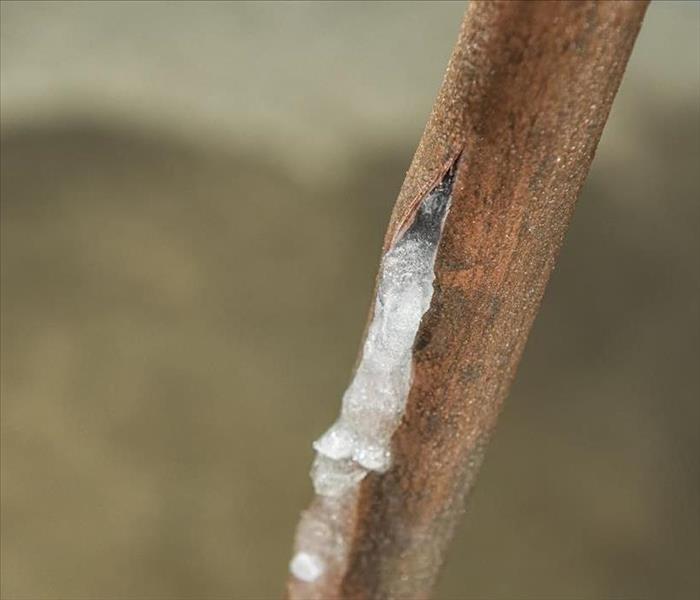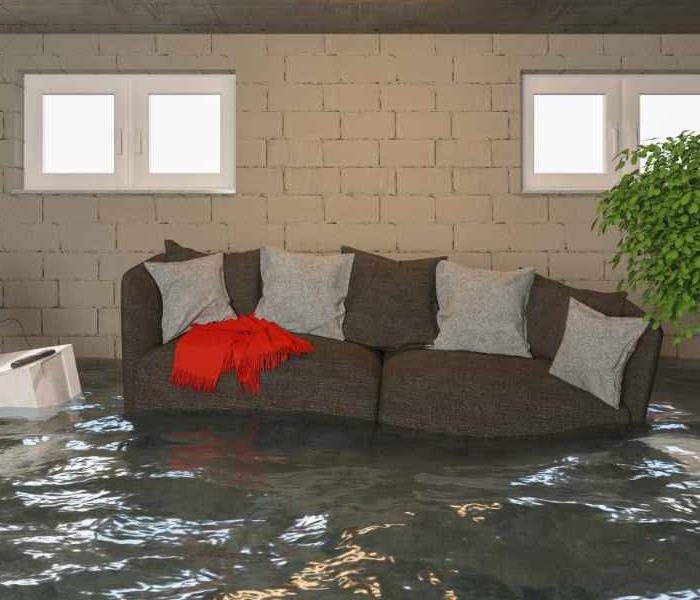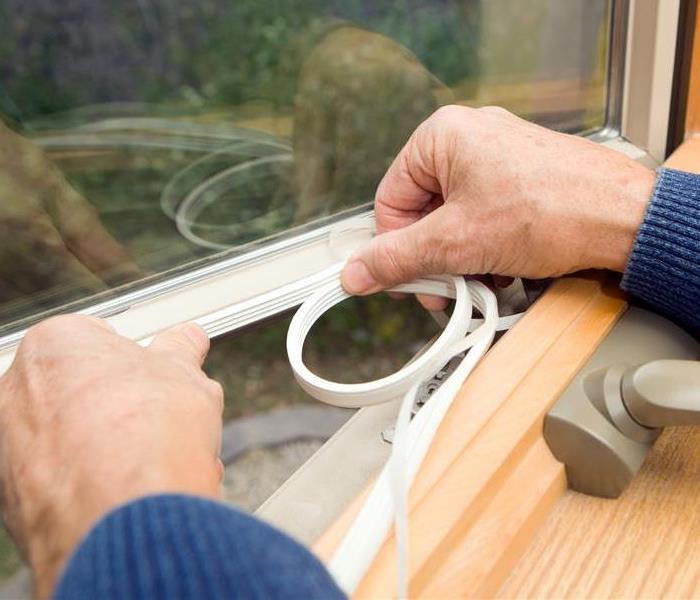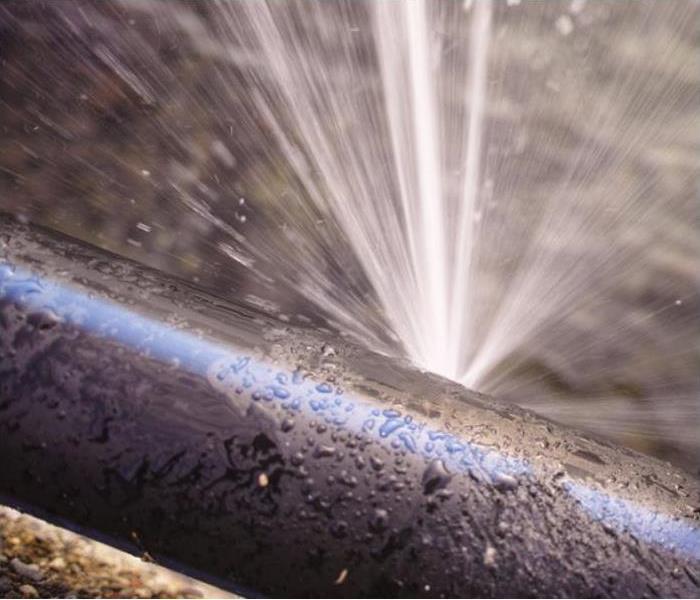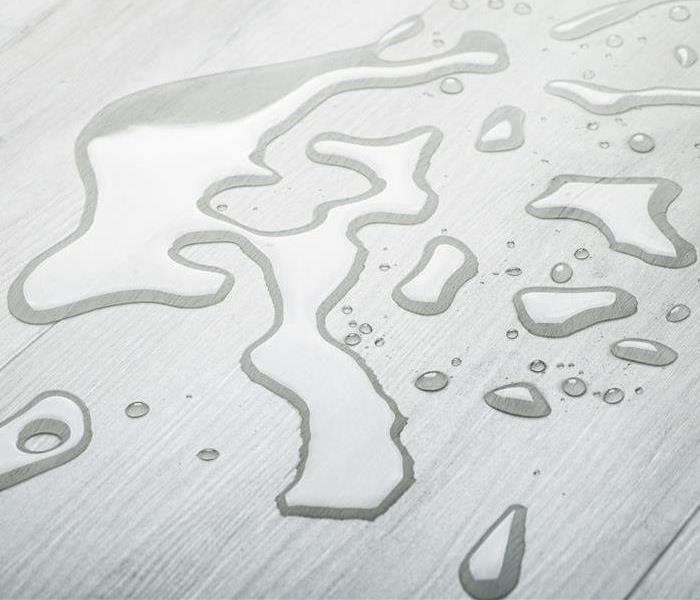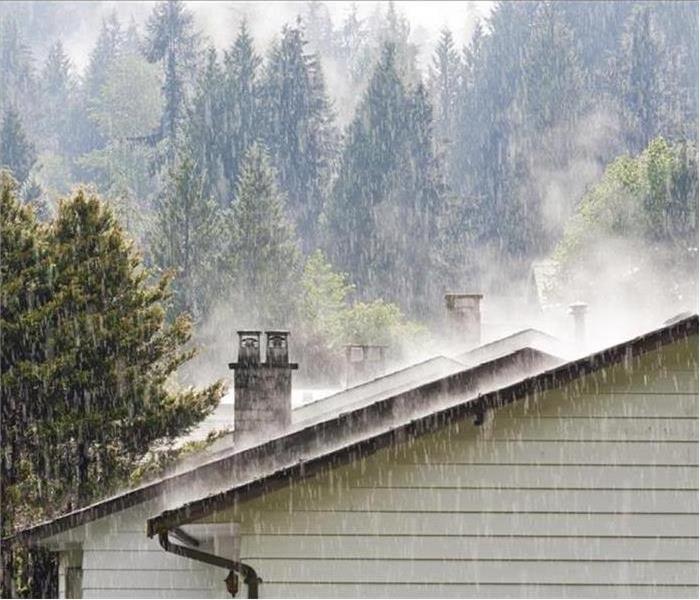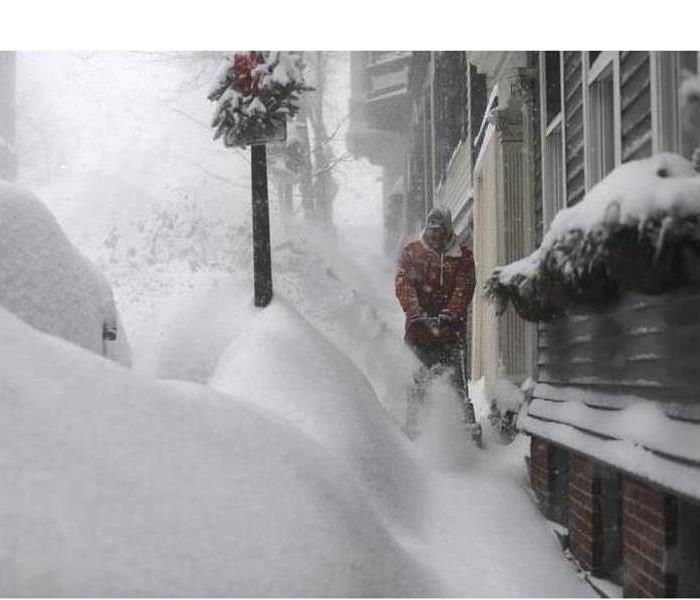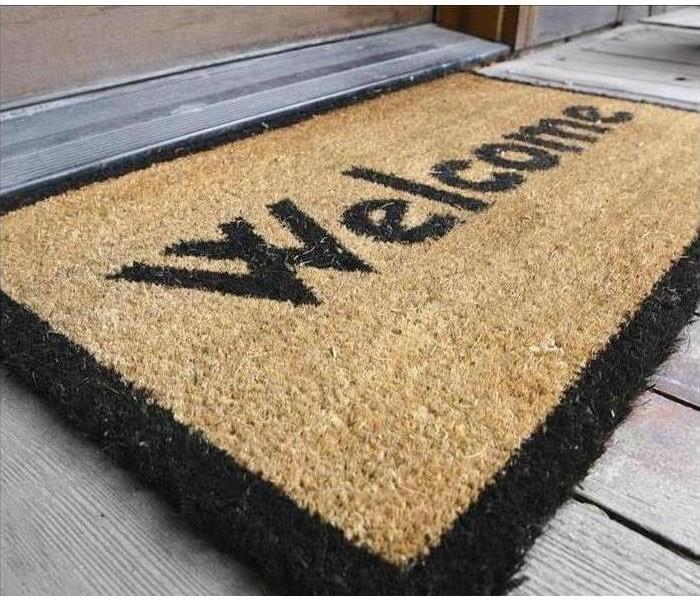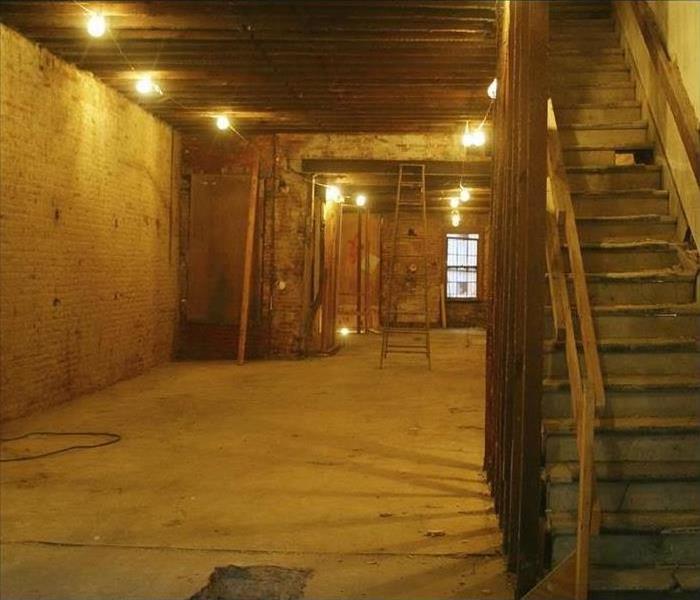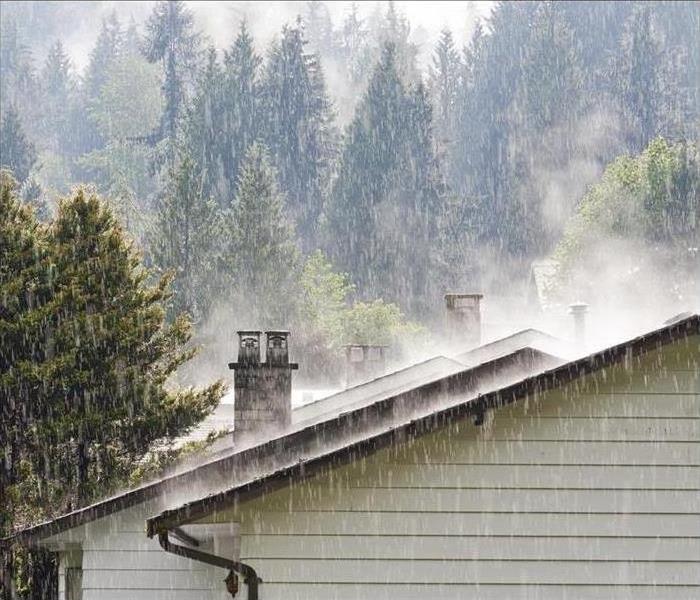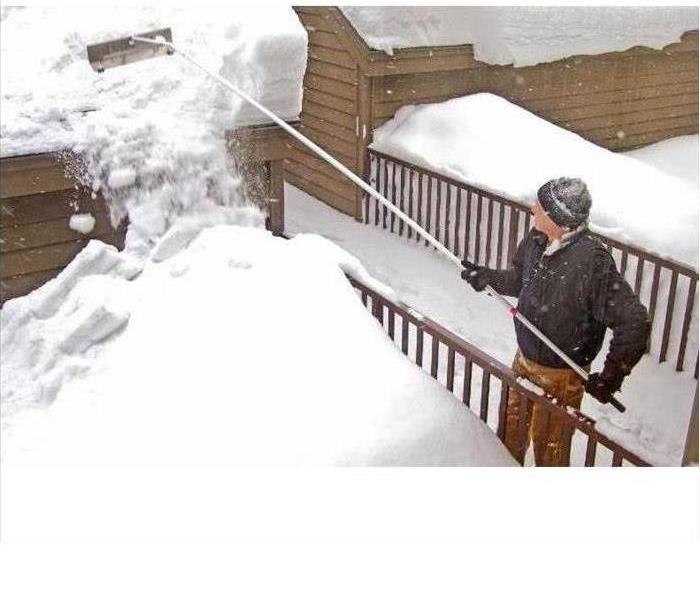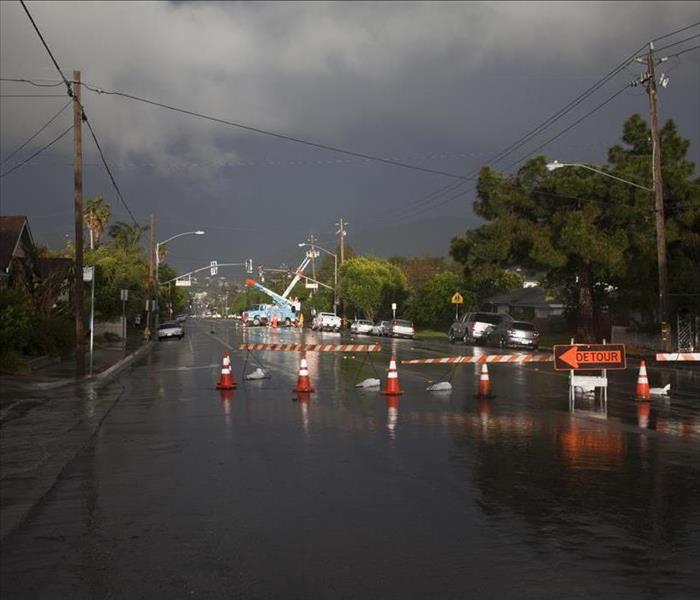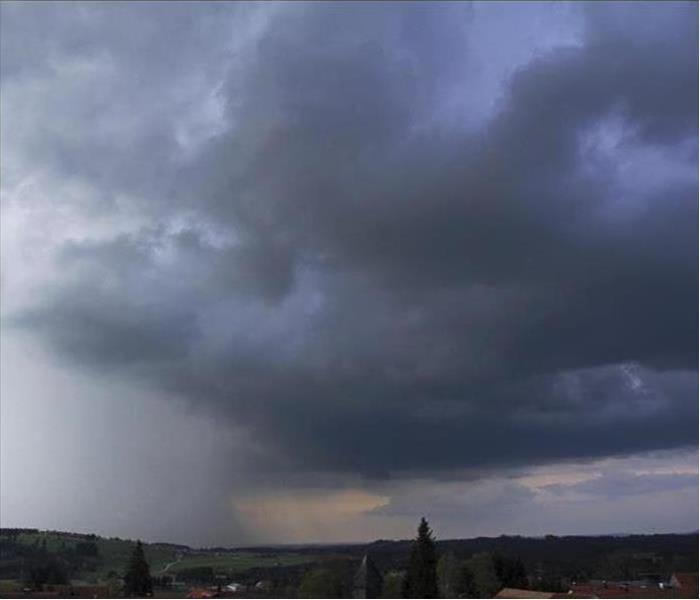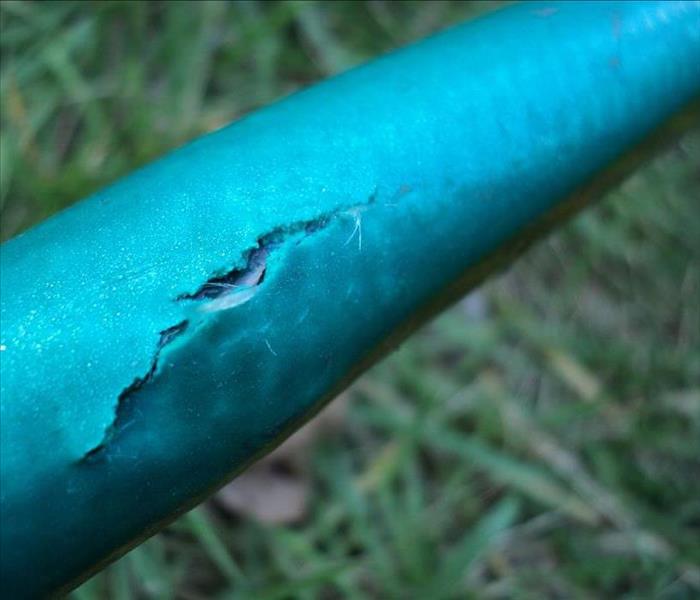Archived Water Damage Blog Posts
Dealing with Frozen Pipes: What Homeowners in East Meadow and Westbury Need to Know
2/20/2025 (Permalink)
Winter in East Meadow and Westbury can be brutal, with freezing temperatures posing a serious risk to your home’s plumbing system. Frozen pipes are a common problem during the cold season, and if left unaddressed, they can lead to costly water damage. At SERVPRO of East Meadow/Westbury, we’re here to help you understand how to deal with frozen pipes and prevent them from becoming a major issue.
Why Do Pipes Freeze and Burst?
Frozen pipes occur when water inside the pipes turns to ice due to low temperatures. As the water freezes, it expands, creating significant pressure inside the pipe walls. This pressure can cause cracks or bursts, resulting in water leaks that can damage your home’s walls, floors, and valuable belongings.
Common areas where pipes are most at risk of freezing include:
- Pipes located in unheated basements, attics, or crawl spaces
- Outdoor hose bibs and sprinkler systems
- Pipes along exterior walls without sufficient insulation
If you experience low water pressure, strange gurgling noises, or visible frost on your pipes, you could be at risk of a frozen pipe burst.
Steps to Take When You Have Frozen Pipes
If you suspect frozen pipes in your East Meadow or Westbury home, acting quickly is critical to minimize water damage.
1. Turn Off the Main Water Supply
This prevents additional water from entering the frozen section and causing further damage.
2. Open Faucets
Opening the faucets helps relieve pressure and encourages melting by allowing water to flow once thawed.
3. Thaw Pipes Safely
Use a hair dryer, heating pad, or space heater to warm the pipe gradually. Never use open flames, such as a blowtorch, as they can cause fires or further damage.
4. Check for Leaks
Once the pipe thaws, inspect it for any signs of cracks or leaks. If you discover any, turn off the water immediately and call for professional assistance.
The Importance of Immediate Water Damage Restoration
A frozen pipe burst can release gallons of water in a short period, leading to significant damage. Walls, floors, furniture, and electrical systems are all at risk. If water damage is not addressed promptly, mold growth can begin within 24 to 48 hours.
At SERVPRO of East Meadow/Westbury, we offer 24/7 emergency water damage restoration services to quickly mitigate damage and restore your home. Our comprehensive process includes:
- Immediate Inspection and Damage Assessment: We evaluate the extent of water damage and create a tailored restoration plan.
- Water Removal and Extraction: Using powerful pumps and vacuums, we eliminate standing water quickly.
- Drying and Dehumidification: We deploy industrial-grade drying equipment to prevent further damage.
- Cleaning and Sanitizing: We clean affected areas to remove any bacteria or contaminants.
- Restoration and Repairs: Whether it’s minor repairs or major reconstruction, we’ll restore your home to its pre-damage condition.
Preventing Frozen Pipes in East Meadow and Westbury
Taking preventative measures can save you the stress and expense of dealing with burst pipes. Here are some tips:
- Insulate Exposed Pipes: Install pipe insulation or heat tape in unheated areas such as attics, basements, and crawl spaces.
- Seal Cracks and Drafts: Close gaps around windows, doors, and walls to prevent cold air from affecting your pipes.
- Keep Your Home Warm: Maintain a consistent indoor temperature, even when you’re away.
- Let Faucets Drip: Allowing a small trickle of water to flow can prevent freezing by relieving pressure in the pipes.
- Disconnect Outdoor Hoses: Drain and store garden hoses, and shut off outdoor water valves to avoid backflow issues.
Trust SERVPRO of East Meadow/Westbury for Water Damage Restoration
Frozen pipes can strike without warning, but you don’t have to face the aftermath alone. SERVPRO of East Meadow/Westbury is your trusted partner in water damage restoration. Our team is IICRC-certified and equipped with the latest tools to address any size disaster, ensuring your home is safe and secure.
We also work directly with your insurance company to streamline the claims process and reduce your stress during recovery.
Act Fast to Minimize Water Damage in Your Home
If you’re dealing with frozen pipes or water damage, contact SERVPRO of East Meadow/Westbury immediately. Our experts are available around the clock to provide fast, reliable water damage restoration services that protect your home and give you peace of mind this winter.
How to Protect Your Home from Basement Flooding During Winter
11/8/2024 (Permalink)
Winter brings more than just cold weather—it also introduces the risk of basement flooding. Between melting snow, heavy rain, and freezing temperatures, homes are vulnerable to water damage if preventive measures aren’t taken. Here are some essential steps you can follow to protect your basement from flooding this winter. If water damage does occur, trust SERVPRO of East Meadow/Westbury for expert water damage restoration services.
1. Clean Your Gutters and Downspouts
Proper drainage is key to preventing basement flooding. Gutters and downspouts are your home’s first line of defense in managing rain and melted snow. Ensure your gutters are clear of leaves and other debris that can block water flow. This simple task prevents water from pooling around your foundation, which can easily lead to leaks and basement flooding.
Downspouts should be positioned to direct water at least five feet away from your home’s foundation. If necessary, consider adding downspout extensions to ensure water is effectively routed away from your basement.
2. Seal Foundation Cracks
Water can seep through even the tiniest cracks in your foundation walls or floors, gradually worsening and leading to extensive damage. Before winter sets in, inspect your basement for any cracks or gaps in the foundation. If you find any, seal them with waterproof caulking or use a waterproofing sealant to block moisture from getting in.
Larger cracks may require professional attention, but for minor gaps, DIY solutions like hydraulic cement or epoxy fillers can provide an effective seal. Regular inspection and maintenance of your foundation are essential for keeping water out.
3. Install a Sump Pump
A sump pump is one of the most effective tools for protecting your basement from flooding. It automatically detects rising water levels and pumps water away from your home, preventing flooding before it starts. If you don’t already have a sump pump, consider installing one, especially if your basement is prone to water issues.
For homes with existing sump pumps, regular maintenance is crucial. Check your sump pump at the start of the winter season to ensure it’s working correctly. You may also want to invest in a battery backup system in case a power outage occurs during a storm.
4. Improve Your Yard’s Grading
If your yard is sloped toward your home, rainwater and melted snow will naturally flow toward your foundation, increasing the likelihood of basement flooding. To prevent this, make sure your yard is graded so that water drains away from your home. Regrading may involve adding soil around your home’s perimeter to create a gentle slope.
If regrading isn’t an option, consider installing French drains or other drainage systems to direct water away from your foundation and prevent it from seeping into your basement.
5. Maintain Your Sewer System
During heavy winter rains, overwhelmed sewer systems can cause water backups, which lead to basement flooding. Regular sewer maintenance can help prevent blockages and reduce the risk of a backup. Consider having a professional plumber inspect your sewer lines and clean them if necessary, especially if you’ve experienced issues in the past.
In homes with older sewer systems, installing a backwater valve may be a wise investment. This device prevents sewage from flowing back into your home in the event of a backup.
Trust SERVPRO of East Meadow/Westbury for Water Damage Restoration
Even with the best preventive measures, winter flooding can still happen. If your basement does flood, it’s crucial to act fast to minimize damage. SERVPRO of East Meadow/Westbury offers professional water damage restoration services to help remove water, dry your basement, and restore affected areas. Whether it’s due to heavy rain, melting snow, or a burst pipe, we have the expertise and equipment to handle any situation. Don’t wait—contact us to get your home back to normal.
Preparing Your Home for Colder Months: East Meadow and Westbury Edition
10/6/2023 (Permalink)
Winter-Proof Your Home
As the crisp air of autumn arrives, it's time to start thinking about preparing your home for the colder months ahead. In East Meadow and Westbury, where winters can be quite chilly, taking the necessary steps to winterize your home is essential. From winterizing pipes to checking insulation and sealing gaps, we've got you covered. Plus, we'll highlight SERVPRO's expertise in handling issues related to frozen pipes and water damage.
Winterizing Pipes
One of the most common issues during winter is frozen pipes, which can lead to costly water damage. To prevent this, make sure to insulate exposed pipes, especially those in unheated areas like basements and crawl spaces. Pipe insulation sleeves or heat tape can be excellent solutions to keep your pipes warm and functional throughout the winter.
Checking Insulation
Proper insulation is key to keeping your home warm and energy-efficient during the colder months. Check your attic and walls for any signs of damaged or insufficient insulation. If you notice any issues, consider adding more insulation to ensure your home stays cozy and your heating bills remain manageable.
Sealing Gaps
Drafts can make your home feel colder than it actually is and drive up your heating costs. Inspect doors and windows for any gaps or cracks that may allow cold air to seep in. Use weatherstripping or caulking to seal these gaps, ensuring your home remains snug and warm.
SERVPRO's Expertise
At SERVPRO of East Meadow/Westbury, we understand the challenges that winter can bring, especially when it comes to frozen pipes and potential water damage. Our experienced team is ready to respond quickly and effectively to any water-related emergencies. We have the expertise and equipment to handle water extraction, drying, and restoration, ensuring your home is back to its preloss condition in no time.
If you do encounter frozen pipes or water damage this winter, don't hesitate to give us a call. We offer 24/7 emergency services, so you can count on us to be there when you need us most. Our team is highly trained and equipped with advanced technology to mitigate the damage and prevent further issues.
In conclusion, preparing your home for the colder months in East Meadow and Westbury is crucial to maintaining a warm and comfortable living environment while avoiding costly damage. Remember to winterize your pipes, check your insulation, and seal any gaps to keep the cold out. And if you ever find yourself facing water damage issues, SERVPRO of East Meadow/Westbury is here to help, ensuring your home stays safe and dry all winter long. Stay warm, East Meadow and Westbury!
What Happens if You Ignore Water Damage
8/20/2023 (Permalink)
Water Damage Restoration on Long Island
Water damage might seem minor, but ignoring it can lead to major problems. SERVPRO of East Meadow/Westbury is here to explain why addressing water damage promptly is crucial for the health and safety of your property.
Structural Damage
Allowing water to sit can weaken the structural integrity of your property. Over time, wood can warp, metal can rust, and drywall can crumble. This can result in expensive repairs and compromise the safety of your home or business.
Mold Growth
Moisture is a breeding ground for mold, which can spread quickly and release harmful spores into the air. Mold damages the surface and poses serious health risks, especially for those with allergies or respiratory issues.
Health Hazards
Stagnant water can become contaminated with bacteria and other pathogens; this poses a health risk to occupants.
Increased Restoration Costs
The longer you wait to address water damage, the more extensive the restoration process becomes. What might have been a simple cleanup could escalate into a full-scale renovation, costing you more time and money.
In conclusion, water damage should always be addressed. Swift action prevents structural damage, mold growth, health hazards, and increased restoration costs. If you're facing water damage in Nassau County, contact SERVPRO of East Meadow/Westbury immediately for professional assistance. Don't wait—protect your property and the well-being of its occupants.
What to Do if a Plumbing Pipe Bursts at Home
11/21/2022 (Permalink)
What Do You Do If a Pipe Bursts in Your House?
No one ever wants to come home to a plumbing disaster, but sometimes burst pipes happen. If you have a burst pipe in your home, don't panic! The Nassau County water damage repair and restoration professionals at SERVPRO of East Meadow/Westbury are here to share some steps you can take to mitigate the damage and get your plumbing back up and running as soon as possible.
Turn the Water Off
First things first: turn off the water. The last thing you want is more H2O to come gushing into your home, so find the main water shut-off valve and turn it clockwise to close it. Once the water is off, open up all of the faucets in your home to release any built-up pressure in the piping and empty out any remaining H2O in the pipe.
Call Your Plumber
Next, call a professional plumber. This is not a job that you want to tackle on your own, as it can be dangerous and there's a chance you could make the problem worse. The sooner you get a professional on the scene, the better. In the meantime, if safe, mop up any standing water and try to keep the affected area as dry as possible to prevent mold or other damage.
Have the Situation Assessed
Once the plumber arrives, they will assess the situation and take appropriate steps to fix the problem. In some cases, they may need to replace a section of pipe or make other repairs. Once they have finished repairing the burst pipe, they will conduct a pressure test on your plumbing system to ensure that everything is working properly before turning the water back on.
Contact SERVPRO of East Meadow/Westbury to Take Care of the Rest
Burst pipes are never fun, but luckily SERVPRO of East Meadow/Westbury is here to help save the day. As a trusted leader in the water damage restoration industry, our Nassau County rapid response team is here to help 24/7 and will restore your home to its former glory in record time.
To learn more about our water damage repair and restoration services, contact us today at (516) 334-2927!
Water Damage Prevention Tips
8/18/2022 (Permalink)
How to Prevent Water Damage
Did you know that water damage is one of the most common homeowner claims? And whether the destruction is a little or a lot, it’s crucial to fix H20-related damage immediately to avoid structural impairments to your home (and lessen the chance of mold forming).
The Nassau County water damage restoration professionals at SERVPRO of East Meadow/Westbury are here to share some valuable tips on how you can protect your home from water-related damage.
Disconnect Hoses
One easy way to avert water harm is to disconnect your hoses from their spigots (the faucet-like fixture on the side of your home that dispenses water). During the cooler months of the year, if an outdoor spigot is not winterized properly and the hose is still attached, there’s a higher chance that the exterior pipes can freeze. When this happens, the pipe inside your home that’s connected to the unwinterized faucet can burst and cause damage to your walls, floor, foundation, and more.
Clean the Gutters
As you encounter rain showers, ensure your house is protected from impairments. For instance, start getting into the habit of cleaning your gutters a minimum of two times a year to avoid blockages. If the channels of your gutters are filled with contaminants, they will overflow, causing damage to your home's foundation. If you do not feel safe cleaning your gutters on your own, we strongly encourage you to enlist the help of a trusted professional to carry out the task for you.
Understand Your Plumbing System
Knowing how your plumbing system works can help you easily determine the location of any water leaks and the problems behind them. For example, your water pressure should run from 40 to 70 psi; anything over this range will lead to a pipe burst. In the event of a plumbing emergency, learn where your main shutoff is to prevent further damage. Also, doing your research will help you identify the root of the water damage and get it repaired in a timely manner by a professional.
Monitor Your Water Bill
Observing your water bill will help you determine if your plumbing may be on the verge of a potential problem. If your grand total is unusually high, that might indicate there is a water leak somewhere. And after detecting a price jump, you may consider reaching out to a professional to repair the suspected H20 leak at hand. Another way to catch a water issue is to install a water detection device; It will sound an alarm when it is in contact with moisture.
Water Damage Repair and Restoration Services in Nassau County
If your house or business has endured H2O-related damages, you can count on SERVPRO of East Meadow/Westbury for all of your water damage repair and restoration needs. We are a locally-owned and operated trustworthy restoration leader in Nassau County and are here to help clean up your property “Like it never even happened.”
Contact us today at (516) 334-2927 or fill out a form for assistance!
How Water Can Ruin A Home
12/29/2021 (Permalink)
Water, right? It gets things wet, you clean it up, nothing to worry about. Not really! While it might seem like water isn’t a huge issue, it can be one of the most damaging things that creep into your home -- and it’s silent! Below are a few ways water can ruin a home and some things you should be looking out for in order to protect it from happening.
Mold
When stagnant water sits for too long it can breed bacteria, which can then form mold inside your home. Not only can this happen behind walls without you knowing, but different types of mold grow in different areas depending on the type of bacteria -- and some of them can be VERY dangerous. Keep a close eye on anything that looks wet, has a foul odor, or begins to change color.
Water Damage Alone
Water damage can affect the structural integrity of many items in your home. It can weaken a structure by affecting the walls and beams. The high humidity caused by excess water can breed bacteria, cause peeling of paints and other items. Excess moisture is certainly something not to play with or take lightly, and it’s imperative that it’s treated as soon as possible to minimize potential damage.
Flooding
Flooding, which is one of the types of water damage you can see, can be detrimental to those who have valuable items in their home and have other things within their four walls that do not do well with water. Something you may have never thought about is knowing what appliances in your home can cause flooding and how you can prevent that from happening.
If you’re in need of immediate damage restoration for any reason, make sure to partner yourself with a team that can make the situation right the first time. SERVPRO of East Meadow/Westbury has been assisting home and business owners recover from damage for years, and we’d love to help you! Contact us today and we’ll show you how we can make everything right again. 516-334-2927
Damage From Melting Snow
12/29/2021 (Permalink)
Regarding recent snow falls, many people don't know about the risk of your house flooding due to the snow melting. The weather can go from snow one day to 50 degrees the next. This causes all the snow to melt quickly which can put your home in danger. The water from the snow can melt and seep into your house. Now, what can you do to prevent this from happening? Do the same think you'd do to keep rain water out of your basement. Keep it away from the foundation in your house if at all possible. Did you know 1 cubic foot of snow produces around 3/4 gallon of water! If you have a couple of feet of snow piling up against your foundation, you’ve got a ticking time bomb that will result in a flooded basement if not dealt with. What if it's too late and you already have water in your basement?
Call SERVPRO of East Meadow/Westbury to help!
516-224-2927 24 hours a day, 7 days a week, 365 days a year.
24 Hour Emergency Water Damage Service
12/27/2021 (Permalink)
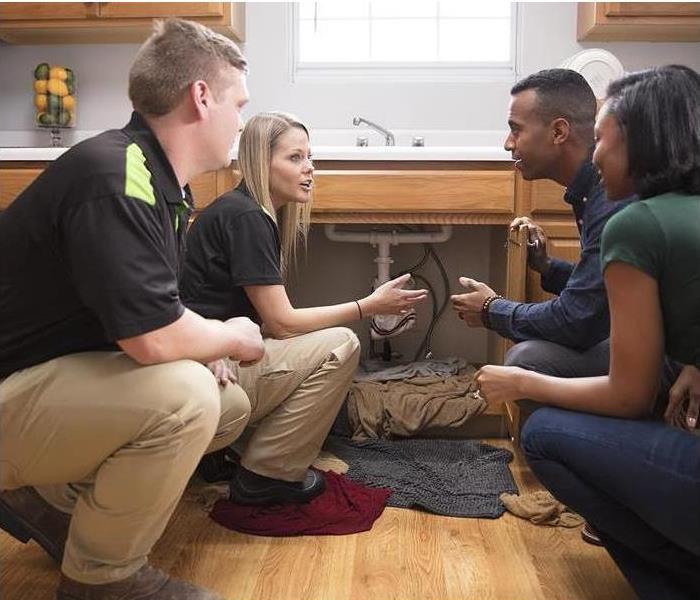 No matter where or what size SERVPRO of East Meadow/Westbury is here for you
No matter where or what size SERVPRO of East Meadow/Westbury is here for you
SERVPRO of East Meadow/Westbury is available 24 hours a day for water emergencies, large or small. When you are dealing with water damage, immediate action is crucial. A delay of just a few hours can greatly increase the severity of the water damage.
We Answer the Phone Ready to Help
Call Today - 516-334-2927
We understand that when you call us, you may be feeling confused, stressed, and vulnerable. You need an expert to guide you through this crisis. SERVPRO of East Meadow/Westbury has the specific water damage training and experience to help you through this tough time. We specialize in water damage restoration—in fact, it's the cornerstone of our business.
What to Expect
When you call, we will ask several questions regarding your water damage emergency. These questions will help us determine what equipment and resources to bring, including how many trained SERVPRO Professionals may be needed.
Our SERVPRO Representative will ask several questions:
- Your name and contact information
- Your insurance information (if applicable)
- The street address of the water-damaged home or business
- When did the flooding or water damage occur?
- What caused the water damage (if known)?
- Is there electricity available (on-site)?
Where is water damage coming from
12/8/2021 (Permalink)
There are times it can be almost impossible to track down the entry of water causing water damage. This can be especially frustrating because the more water that enters the home, the more home damage you're going to notice. Until those sources have been fixed or stopped, the problem is going to arise again and again. To help you out, here a few key areas where water damage typically comes from.
Leaky Roof
Unless your roof is noticeably missing shingles, it's likely that you don't spend a lot of time examining your roof. You may not even realize that it's damaged. However, quite often, a lot of leaking water comes from the attic. A professional team can inspect your roof and attic to determine if the water is coming from a damaged hole or weak spot. If that's the case, a simple repair can most likely keep your house from receiving further damage.
Cracked Foundations
As its name might suggest, the foundation is the cornerstone of your home. If it starts to deteriorate, then you can be sure you'll be seeing a lot of home damage. Water can seep into the foundation and slowly break it down by leaking in through the basement, crawl space, etc. This is typically a result of saturated soil. Sometimes it’s a case of clogged gutters which can no longer send the water away from the house and so the water starts to trickle into the foundation instead. This can be the root of extensive damage which can also find its way into flooring, beams, walls and more.
Faulty Plumbing
Whether your plumbing is compromised some place or the last repair job wasn't top notch, if you have faulty plumbing, then you're likely going to have water leaking in places you don’t want it to. This water can pool up and cause some serious damage to flooring, walls and your sentimental items. It's also a terrible source of waterborne diseases.
To keep your home from suffering from further damage, call us to find those sources of leaking water. We can remediate the problem, fix the damage that was caused and prevent further damage from occurring. SERVPRO of East Meadow/Westbury is dedicated to bringing your home back to a livable state, as quickly as possible. If you’re interested in learning more, give us a call at 516-334-2927!
Is Water Lurking In My Home? A Guide
12/7/2021 (Permalink)
At home, it’s important that you’re always conscious of the environment you’re living in, and you’re aware of any potential changes to the spaces in which you’re occupying. For those reasons, it’s important to know when things are going wrong, or begin to be conscious of the small changes that can point to an issue. When it comes to water damage, your eye must be very keen to understand what may be occurring, and how you can prevent damage in its tracks. See below for a few telltale signs that you may be experiencing water damage at home and how to stop it!
Musky Smells
For the most part, you know what your home smells like, and sometimes it has no smell at all due to it being familiar! However when something begins to permeate through the air, it can be very noticeable. If you experience a musky, humid odor, it’s a sign that in that room or the surrounding area, some type of moisture is present. In order to prevent this from becoming an issue, make sure to have someone come in and inspect the area for water damage, and conduct a search on your own.
Signs Of A Leak
If you’re seeing discoloration in the walls, ceiling, or anything similar, water might be the cause, which can lead to mold growth or permanent damage. It’s important that if this looks like it’s been happening or it’s brand new, you turn off the water supply to stop it from worsening and get it inspected as soon as possible before more damage occurs.
Bugs
A bug infestation usually points to a few possibles. Either you left fruit out too long, or there’s something they like inside your home -- water being one of them. If this happens to you, it’s important to try and source where they’re originating from and take the necessary steps to stop them from getting in and feeding off of whatever it is they are finding.
Dealing with the reality of water damage can be devastating, and we know first hand how hard it can be to return to normal life while this is going on. At SERVPRO of East Meadow our goal is to relieve your stress by handling the entire process of remediation from start to finish. If you’re interested in learning more, give us a call at 516-334-2927!
What Type Of Water Damage Do I Have?
10/18/2021 (Permalink)
After a storm, it’s important that as a home or business owner, the first thing you do is assess the type of damage that your building may have sustained during the ordeal. We know that coming home to a damaged area can be extremely stressful, which is why it’s also important to go through everything quickly in order to understand the extent of the damage, and get to work at figuring out how to fix it. Before you can begin the process of fixing the damage you have, it’s important to understand what the damage actually is, and how serious it can become.
Stagnant Water
One of the worst things to have in your home or business is stagnant water. This can occur due to flooding and heavy rainfall, which causes water to pool and not go anywhere until water is pushed away or the levels decrease. Because the water is sitting still, it’s able to deeply embed itself in flooring, walls and fixtures, which can cause extensive damage, promote mold growth and more. We understand this is a serious concern, and this is why part of our process revolves around making sure that any damage is handled before it causes more!
Spreading Damage
Let’s assume your shingles have been torn off by a storm, allowing water to pass into the house. As this happens, there are a ton of components inside your home that become damaged as the water travels through them. Similar to stagnant water, water that moves through crevices can impact multiple areas at once, causing extensive damage in the process. This can be devastating to a homeowner, and it’s important to understand that it should be fixed as soon as it’s noticed to prevent further damage from occurring.
Dealing with the reality of water damage can be devastating, and we know first hand how hard it can be to return to normal life while this is going on. At SERVPRO of East Meadow our goal is to relieve your stress by handling the entire process of remediation from start to finish. If you’re interested in learning more, give us a call at 516-334-2927!
5 Most Common Causes of Basement Flooding
10/7/2021 (Permalink)
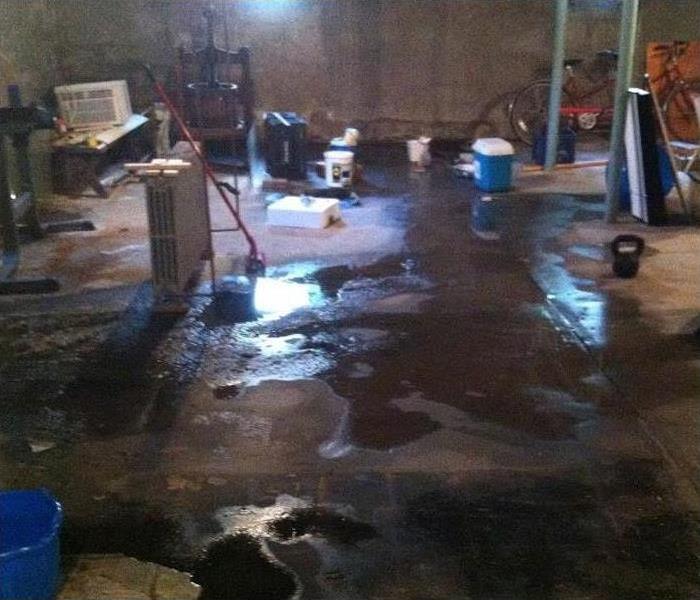 Long Island home with a flooded basement caused by a broken pipe
Long Island home with a flooded basement caused by a broken pipe
Basements are usually used as storage spaces or for additional living space. Because of their subterranean nature, the basements are susceptible to a lot of moisture issues, in particular, in the regions where there is lots of seasonal rain and low elevation level. Homes on Long Island, NY, also come in the same category, and thus are more vulnerable to basement flooding. Flooded basements are not only stressful to handle, but they can also result in high restoration costs as they are a major source of property damage and mold growth. For Long Island Homes, especially, it is helpful to be aware of the most common causes of basement flooding in order to take preventive steps and act promptly to minimize the losses. In this article, we will highlight the 5 most common causes.
- Heavy Rainfall
The topmost cause of basement flooding is heavy rainfall, and prolonged stormy weather. Homes on Long Island are faced with storm rage for extended periods of time. Long Island and similar regions also experience significant rainfall over a shorter span of time.
This water naturally drains downward and likely to flood basements if the home’s drainage system is not set up properly. Oversaturated earth overwhelms basement waterproofing if conditions are favorable, pushing water through foundation cracks, porous concrete and tile grout.
- Water Leakages
Water leakages arising out of obstructed, leaky or broken pipes, is another major cause of basement flooding. Unfinished basements usually have exposed plumbing, leaving them vulnerable to flooding from pipe freezing and malfunctioning drains and pipes. Older homes on Long Island, tend to have original metal based plumbing that corrodes with time. When temperatures fall below 32 degrees, these unprotected pipes may freeze and burst, leading to a flood. Damaged or clogged sewer lines cause sewage backups and submerge basements with contaminated water.
- Unprotected basements
Unprotected basements are exposed to greater risk of flooding. You can try some tips to keep rainwater away from your basement. For instance, seal the doors and egress windows properly. Keep downspouts and gutters free of debris. Install downspout extenders, a sump pump and perimeter drain.
- Leakage from Water Heaters
The water heater often becomes a source of basement flooding. Irrespective of the cause, the leakages from a water heater can lead to huge problems, eventually causing failure of the tank. There is an endless water supply since tanks are made to be filled continuously. This is a huge amount of water flowing through your home if you don’t stop it. Any leakage must be inspected and repaired on immediately.
- Inappropriate home location
It has been observed that many home on Long Island were built on unsuitable locations. In addition, the overall low elevation of the region is another problem. If the grading of your home is not properly designed, surface drainage can be directed towards your building, causing basement flooding. Reshaping of your yard so that storm or rain water can flow away from home’s foundation can help.
If you want to know more about the best preventive ways to tackle basement flooding or are seeking for highly specialized and professional home emergency restoration services, call one of the best emergency restoration companies on Long Island, SERVPRO of East Meadow / Westbury, right away.
How does the Cold Affect Water Damage
2/8/2021 (Permalink)
If it’s never happened to you before, you may not think twice about the possibilities of water damage. With winter officially upon us, rain will be turning into snow, which will begin to accumulate on and around your home. A real possibility is that it will then turn into ice, which is even harder to keep away from your home. Below are a few ways the cold weather can cause damage to your home this winter season and how it can pose a threat.
Ice
When you first think about ice, the immediate dangers may not be obvious. However, ice that is packed to your roof, on your driveway, or even against your siding can slowly damage those areas over time. Chips can form, which can expose your house to the outside elements. All of that heat you're trying to keep within the home can now actually leak outside, while moisture can find its way inside. It’s best to monitor condensation and any changes you see within your home.
Cracks/Leaks
Ice can also cause cracks when it's lodged inside of something. Again, that expanding and shrinking that ice does with varying temperatures causes any surface to move with it. This can cause that area to crack or bend in response, which can impact the integrity of your home. When the ice eventually melts, that water can leak right into those cracks and cause both water and mold damage wherever it goes.
Exposure To Mold
One last aspect that you might not consider is the role of mold. While mold requires a certain temperature and moisture to spore and grow, it's still alive within the ice. You may not think twice about it if you notice a bit of ice in your home, but it’s important to be weary. When that ice melts, the mold bacteria can be released inside of your home and cause damage, odors, and costly repairs.
If you or someone you care about experiences damage this winter, make sure your first step is the right one. When it comes to managing the damage, make sure the team you call is professional and swift with their efforts. SERVPRO of East Meadow/Westbury is at the ready 24/7, no matter the emergency. To receive assistance for water damage, get in contact with us today at 516-334-2927!
5 Most Common Causes of Basement Flooding
12/8/2020 (Permalink)
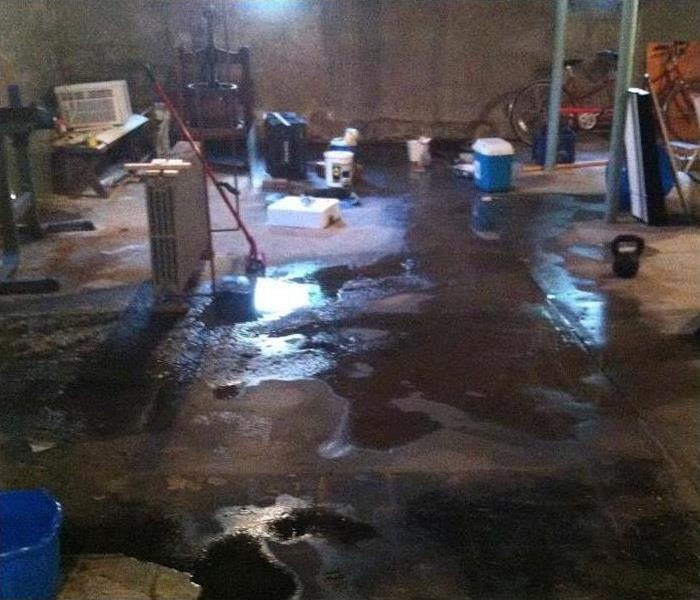 Long Island Home with a flooded basement caused by a broken pipe
Long Island Home with a flooded basement caused by a broken pipe
Basements are usually used as storage spaces or for additional living space. Because of their subterranean nature, the basements are susceptible to a lot of moisture issues, in particular, in the regions where there is lots of seasonal rain and low elevation level. Homes on Long Island, NY, also come in the same category, and thus are more vulnerable to basement flooding. Flooded basements are not only stressful to handle, but they can also result in high restoration costs as they are a major source of property damage and mold growth. For Long Island Homes, especially, it is helpful to be aware of the most common causes of basement flooding in order to take preventive steps and act promptly to minimize the losses. In this article, we will highlight the 5 most common causes.
- Heavy Rainfall
The topmost cause of basement flooding is heavy rainfall, and prolonged stormy weather. Homes on Long Island are faced with storm rage for extended periods of time. Long Island and similar regions also experience significant rainfall over a shorter span of time.
This water naturally drains downward and likely to flood basements if the home’s drainage system is not set up properly. Oversaturated earth overwhelms basement waterproofing if conditions are favorable, pushing water through foundation cracks, porous concrete and tile grout.
- Water Leakages
Water leakages arising out of obstructed, leaky or broken pipes, is another major cause of basement flooding. Unfinished basements usually have exposed plumbing, leaving them vulnerable to flooding from pipe freezing and malfunctioning drains and pipes. Older homes on Long Island, tend to have original metal based plumbing that corrodes with time. When temperatures fall below 32 degrees, these unprotected pipes may freeze and burst, leading to a flood. Damaged or clogged sewer lines cause sewage backups and submerge basements with contaminated water.
- Unprotected basements
Unprotected basements are exposed to greater risk of flooding. You can try some tips to keep rainwater away from your basement. For instance, seal the doors and egress windows properly. Keep downspouts and gutters free of debris. Install downspout extenders, a sump pump and perimeter drain.
- Leakage from Water Heaters
The water heater often becomes a source of basement flooding. Irrespective of the cause, the leakages from a water heater can lead to huge problems, eventually causing failure of the tank. There is an endless water supply since tanks are made to be filled continuously. This is a huge amount of water flowing through your home if you don’t stop it. Any leakage must be inspected and repaired on immediately.
- Inappropriate home location
It has been observed that many home on Long Island were built on unsuitable locations. In addition, the overall low elevation of the region is another problem. If the grading of your home is not properly designed, surface drainage can be directed towards your building, causing basement flooding. Reshaping of your yard so that storm or rain water can flow away from home’s foundation can help.
If you want to know more about the best preventive ways to tackle basement flooding or are seeking for highly specialized and professional home emergency restoration services, call one of the best emergency restoration companies on Long Island, SERVPRO of East Meadow / Westbury, right away.
Do's and Don'ts When Pipes Freeze
12/7/2020 (Permalink)
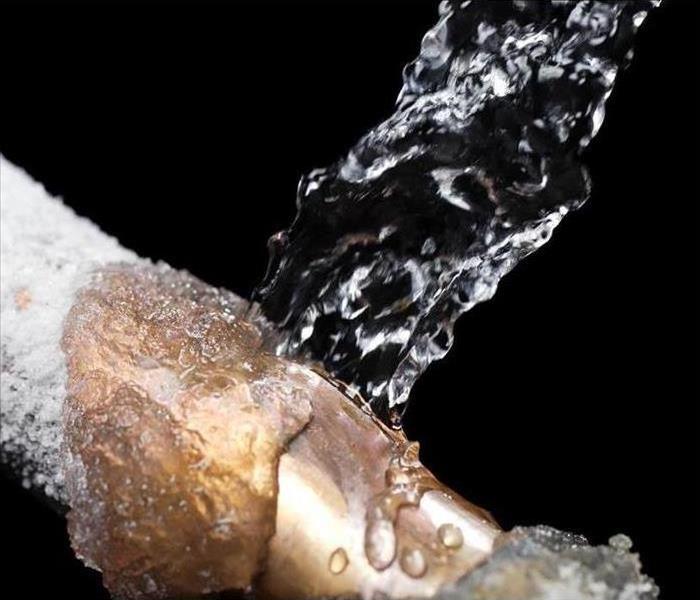 Don't Let Your Pipes Freeze! SERVPRO of East Meadow / Westbury is here to help!
Don't Let Your Pipes Freeze! SERVPRO of East Meadow / Westbury is here to help!
Frozen pipes are a common problem for home owners during the winter months. Causing a lot of trouble and havoc in our homes. However, do you know the reasons behind frozen pipes and pipe bursts? Knowing so can help prevent your home’s pipes from freezing and rupturing.
You will be surprised to know the cold weather is not the major reason for frozen pipes! The actual factor is the internal pressure that is built inside the pipes. However, the cold weather does play a role in developing this pressure. The freezing process expands the water molecules into different shapes, in turn, occupying more space within the pipes than what they occupy in liquid state. Because of this expansion, they force water towards an appliance, for instance the faucet, leading to significantly higher water pressure. When immense pressure is developed, the pipe finally freezes or ruptures, resulting in severe water damage.
There is no need to worry about it now, since there are certain ways to minimize the loss. Let take a look at the different ways you can prevent frozen pipe bursts.
Things to do when pipes freeze
Check the water pipes outside of your home that are not covered by anything or those placed in unheated areas. Make a list of uncovered pipes.
Insulation of pipes is a proven and well recognized means to avoid pipes from freezing. You should insulate pipes by putting foam on their outer surfaces. A professional home emergency restoration service like SERVPRO of East Meadow / Westbury can help prepare your pipes for winter.
For the pipes that are uncovered, put a dome or some other kind of insulating cover on spigots or outdoor faucets. These are readily available at most local hardware stores.
Going away for a few days? This technique really works. Let a little quantity of water to flow or drip through the faucets. It prevents the pressure from building in the pipes. If the weather is extremely cold, it is advised to keep either one or two faucets running slowly all the time. Water passing through the system can prevent the freezing as moving water can’t freeze.
Supply some heat to the pipe areas by using electric hair dryer or heating pad. You may also use towels soaked in warm water.
Examine the air leaks around dryer vents, pipes and electrical wiring. Use insulation or caulk to keep the cold air away from pipes. In extremely cold weather, even the smallest opening may let the cold air enter the pipe, causing it to freeze.
Make sure you properly examine the section of the pipes between faucet and frozen area. Monitoring the status of pipe is critical to avoid pipe freezing.
Things NOT to do when pipes freeze
Most of the people incur more damage by following the wrong tips. It is advised not to do these things when your home’s pipes are freezing. In addition, if you avoid these things, you can also minimize the chances of pipe freezing.
- Never leave a space heater set up under the home, unattended or turned on. This is extremely dangers and one of the main causes of home fires.
- Don’t use a propane heater, blowtorch, charcoal stove and any open flame device as an insulation or heating mechanism.
- Close faucet or stop water flow until the pipe is thawed completely and the water is able to flow freely
If you have any doubt or not confident in you abilities to execute any of these tips, or you are simply not sure what your are doing, you must call an expert home emergency restoration professional like SERVPRO of East Meadow / Westbury. Frozen pipes don’t always result in ruptures and bursts. If you take precautions on regular basis, monitoring your home’s pipes and taking action when required, you can surely prevent your home from looking like a swimming pool and the consequential water damage restoration expenses.
Interesting Water Damage Facts
10/14/2020 (Permalink)
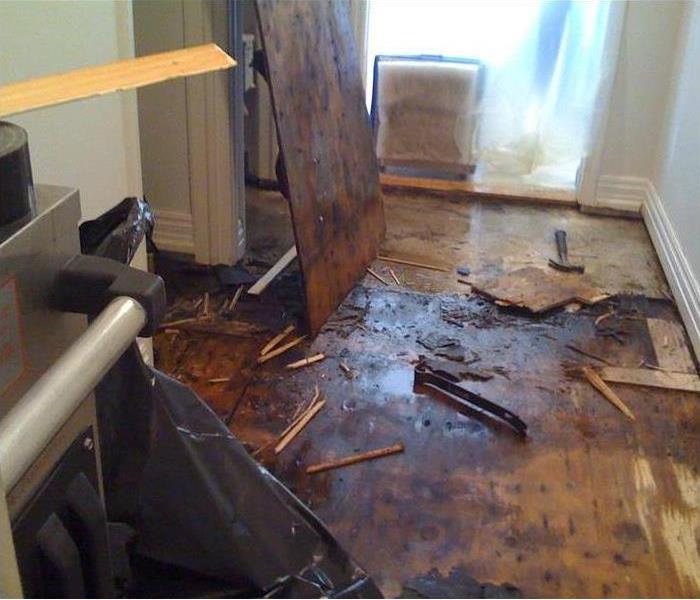 Water Damage in Homes is on the Rise
Water Damage in Homes is on the Rise
According to the American Insurance Association, “Water damage claims have been growing faster than other components of homeowners insurance.” Water damage can come from natural disasters, plumbing failure, and a range of other sources. Water damage in homes most typically comes from the following causes:
- Frozen pipes
- Leaking pipes
- Leaky roof
- Broken washing machine hose
- Plumbing problems
- Insulations issues
The following are some of the most interesting Water damage statistics:
- Almost 40 percent of all homeowners have said that they have experienced loss from Water damage.
- About 93 percent of all Water damage can be prevented.
- Water damage is the second most frequently filed insurance claim in the United States.
- 250 gallons of Water is released a day due to a 1/8-inch crack in a pipe.
- About 20 percent of all insurance claims related to Water damage of some kind.
- Billions of dollars in property losses are spent each year as a direct result of water damages.
SERVPRO of East Meadow/Westbury has the experienced and properly trained team to take care of any possible level of water damage, large or small. We have the equipment and the team at the ready 24 hours a day, 365 days a year.
If you or your family has experienced Water damage call SERVPRO East Meadow/ Westbury (516) 334-2927 today.
Mold Damage & Water Issues
10/1/2020 (Permalink)
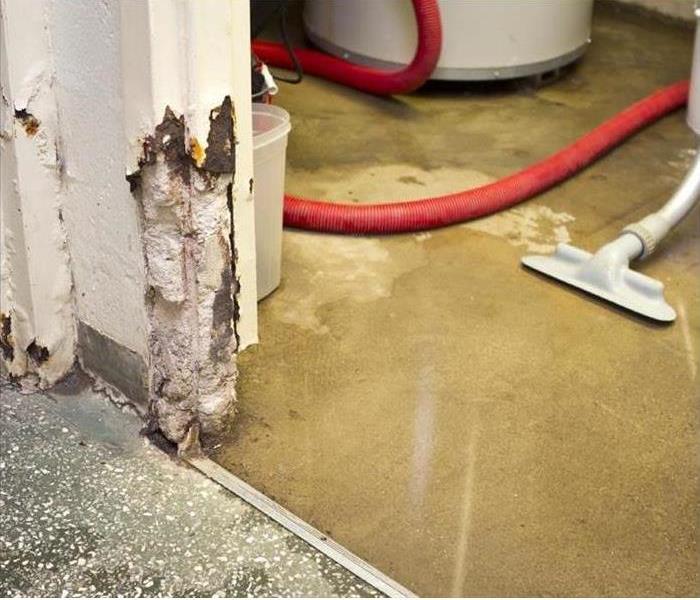 Water & Mold Damage
Water & Mold Damage
Water damage can be a huge red flag to someone at home, and mainly because most of the time, it means more damage is going to occur. Mold is something that everyone should be looking out for, and if you’re lacking in the search, it’s important to make sure that you have someone who can help the situation quickly.
Mold Spreads Fast
Simply put, water damage can’t be ignored, even for a short period of time. When moisture spreads through any medium, mold is bound to pop up which can hinder a happy home or business at anytime. Not only can a foul odor present itself, but much work has to be done in order to get rid of it. Additionally, the last thing anyone wants to do is associate with a place known for mold.
Renovations Are Necessary
If there’s a leak that’s been left without repair for an extended period of time, the simple remedies sometimes just don’t work. Instead of replacing the source of the leak, gutting may become necessary based on the total amount of damage caused by the water. What began as a mild inconvenience is now a very large project — but it doesn’t have to be that way!
What Can I Do?
Regardless of the type of leak or damage, you must act fast on all fronts to ensure that everything remains the way it should. With SERVPRO of East Meadow/Westbury, our on-call team is ready to assist you immediately with anything you might be experiencing at home or at your business. If water damage has taken over and is threatening your enjoyment of the holidays, make sure to have it taken care of before it’s too late.
SERVPRO of East Meadow/Westbury is a locally owned and operated business with the team and resources to handle any size disaster. We know that issues like these can be stressful, and we are here to make the restoration process as seamless as possible.
For water or mold restoration services, call 516-334-2927 or contact us online for immediate assistance!
How Water Can Ruin A Home
1/31/2020 (Permalink)
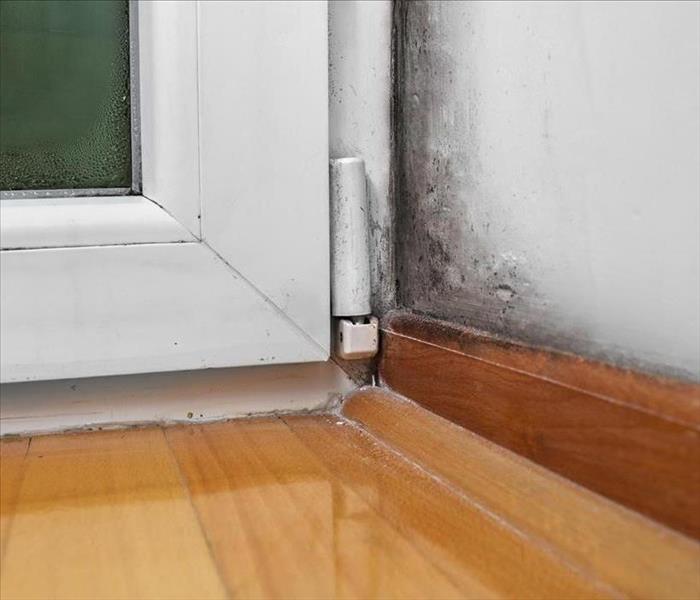 black mold damage on wall & molding near interior door with moisture on door window
black mold damage on wall & molding near interior door with moisture on door window
Water, right? It gets things wet, you clean it up, nothing to worry about. Not really! While it might seem like water isn’t a huge issue, it can be one of the most damaging things that creep into your home -- and it’s silent! Below are a few ways water can ruin a home and some things you should be looking out for in order to protect it from happening.
Mold
When stagnant water sits for too long it can breed bacteria, which can then form mold inside your home. Not only can this happen behind walls without you knowing, but different types of mold grow in different areas depending on the type of bacteria -- and some of them can be VERY dangerous. Keep a close eye on anything that looks wet, has a foul odor, or begins to change color.
Water Damage Alone
Water damage can affect the structural integrity of many items in your home. It can weaken a structure by affecting the walls and beams. The high humidity caused by excess water can breed bacteria, cause peeling of paints and other items. Excess moisture is certainly something not to play with or take lightly, and it’s imperative that it’s treated as soon as possible to minimize potential damage.
Flooding
Flooding, which is one of the types of water damage you can see, can be detrimental to those who have valuable items in their home and have other things within their four walls that do not do well with water. Something you may have never thought about is knowing what appliances in your home can cause flooding and how you can prevent that from happening.
If you’re in need of immediate damage restoration for any reason, make sure to partner yourself with a team that can make the situation right the first time. SERVPRO of East Meadow/Westbury has been assisting home and business owners recover from damage for years, and we’d love to help you! Contact us today and we’ll show you how we can make everything right again. 516-334-2927
Three ways Water can slip into your home...
1/8/2020 (Permalink)
While we rely on water for many facets of daily life and want and need it around, we certainly don't need unnecessary water in our home. Standing water can break down the components that make up our home’s foundation and cause a great deal of damage in the process. You might be surprised to know it’s pretty easy for water to creep into your house. Here are three ways that water can sneakily slip in the house and cause water damage.
Ice
It may sound odd to say ice can seep into your home since it's a solid, but we have to remember that it begins as a liquid…. Water can trickle into the home through a crack or leak during warmer weather and then begins freezing and hardening up into ice as the temperature drops. This ice can cause a great deal of home damage before eventually melting once more and pooling somewhere in your home. Ice also has the ability to break apart your homes construction, like your roof and potentially leave your attic accessible to further water.
Rain
If you have a roof with less than perfect shingles, you can be sure it's letting in rain and excess water. Here’s where your issue can come in, that rain can collect in your attic and cause a whole bunch of unpleasant water damage, mold growth and more. If you notice that your ceiling or roof is starting to sag, then the damage has reached critical levels and it’s time to act!
Runoff
One last aspect that water may be leaking into your home is through cluttered gutters and excess runoff at ground level. Without the gutters able to perform their duty of sending rain away from the home, that water begins to collect and saturate the soil. It can leak into your basement, through your foundation and actually flood. You'll be left with quite the mess and likely an exposure to mold as well.
Guard Against Water
At SERVPRO of East Meadow/Westbury, we can help protect your home against the damage water can cause. Our process is to make everything brand new again. If you’re interested in learning more about how we can help you, please give us a call at 516-334-2927!
Water Damage Caused By The Weather
10/11/2019 (Permalink)
Hot weather; we all love it, until it gets too hot, or causes unwanted damage. You might be asking yourself how hot weather can cause damage -- specifically water damage, there’s actually a mild science behind some of the issues that are repeat offenders of damage! As we’re still experiencing some of the weather that leaves us begging for the air conditioner, take a look below to see how it can affect and cause damage near or inside your home/business.
Humidity
Hot, moist air is the worst. It makes breathing harder, objects feel sticky, and it’s plain uncomfortable. In addition to how it makes you feel, your home/business can suffer from its effects as well! Humid air that lingers inside of a room or building can cause issues with the flooring, walls, windows, and everything in between. This moisture in the air can be a huge problem, leading to mold growth and other damage if left in the area for too long. Make sure to keep your air circulating or invest in a dehumidifier if possible.
Exterior Runoff
When the sun hits the soil or ground, it dries out -- and when you’re trying to water plants or the grass and it simply won’t absorb, the water finds another place to go, and that’s often anywhere it wants. Excess water runoff due to dry grounds can cause pooling water around your home, in areas where it shouldn’t sit, and many more issues. This, in turn, causes bug infestations, leaks, and sunken points in your yard that can lead to great problems down the line. It’s important to monitor the ground when you’re watering plants, the grass, and other things in and around your home or business.
Should you deal with any water damage this season, don’t panic! SERVPRO of East Meadow/Westbury has been providing homes and businesses with water damage mitigation for over 50 years, and we’re just getting started! For 24/7 emergency service, make sure to keep our number handy and contact us at 516-334-2927 with anything you might need!
Is My Home At Risk For Rainshower Damage?
8/23/2019 (Permalink)
There are a ton of added benefits to owning your own home, such as private space for relaxing, being able to decorate the home how you’d like, and more! However when it comes to owning a home and having to deal with spring shower damage, there are different factors to consider and what to look out for when damage occurs. Below are a few notions that you may be at risk for spring shower damage and what you can do to prevent it!
Check The Top
One of the most important things to consider is where the rain is hitting your home first. Generally, this happens on the roof, or close to the foundation, which can be costly for both you and those who may also be tenants, if you happen to rent. Make sure you’re checking roofing shingles and the foundation for any adverse effects or anything that looks out of place, worn out, or broken.
How Is The Humidity?
Monitoring your humidity levels can be a great way to understand if your home is at risk for water damage due to a spring shower. Because water can creep into your home and cause more humidity than you want, it’s important to monitor levels and look for unexpected spikes after a storm. If this is happening in certain rooms, moisture is somehow getting in.
You Can Call Us
The best thing to have by your side after heavy rain causes damage is someone who can be at the ready and help your home immediately after. One of the best reasons to have someone like us on speed dial is that we are fast, effective, and can make your home look “Like it never even happened”. When disaster strikes, our mission is to get you and your home back up and running quickly, alleviating stress and discomfort felt by nature.
When rain is barreling toward Long Island, know that there is a local company ready to help you at the drop of a dime. SERVPRO of East Meadow/Westbury has been helping local families and businesses recover after all types of damage, and your case is no different. To receive assistance with water, fire or storm damage, give us a call at 516-334-2927!
Avoiding Water Damage The Easy Way
8/13/2019 (Permalink)
It’s all too common that during the summer months, the sight of excess water is followed up with the famous “the sun will dry it up” line. And while sometimes this is true, that extra pool of water can lead to expensive damage that is not so easily cleaned up as it was once thought to be. Below are a few different ways to avoid water damage in areas that it may occur in around your home or business.
Observe Water Levels
Watering the grass? That seems like an easy task, right? Sure it does! But it’s not as simple as moving the sprinkler to a desired location and turning it on. Watering your grass and plants is far from a ‘set it and forget it’ system, and requires much more to be efficient. Make sure that you’re watering at a time where your plants can absorb the water without burning off too quickly, and also keep in mind that too much can be an issue. Check your ground every 15 minutes depending on the surface area for spongy soil. Once it saturates enough, turn it off! Too much water near a home can lead to bugs and indoor water damage not usually seen by the naked eye.
Don’t Overuse
Similar to the above, using too much water during the hot months can be an issue once humidity becomes a factor. It’s important to make sure that you’re keeping your water usage in check in places like your bathroom, kitchen and more. This type of damage occurs when too humid of air meshes with too much moisture coming from faucets and showers, which leads to water in areas such as on the wall, behind fixtures, in cracks and more. This, among other things, can lead to mold and mildew formation.
Lose The Humidity!
It’s important to monitor your humidity levels everywhere in the house -- and not JUST because it causes you to stick to the couch! These high levels of humidity can be tracked in from outside and leave foul odors and moisture on the walls. To prevent this, an inexpensive dehumidifier can be a real benefit!
When heat/humidity is barreling toward Long Island, know that there is a local company ready to help you at the drop of a dime. SERVPRO of East Meadow/Westbury has been helping local families and businesses recover after all types of damage, and your case is no different. To receive assistance with water, fire or storm damage, give us a call at 516-334-2927!
3 Activities That Lead To Water Damage
8/7/2018 (Permalink)
Enjoying your summer includes being able to enjoy the sunlight and heat in the comfort of your own home -- and conversely, there are also a ton of ways you can enjoy cooling down! While we are never opposed to a super soaker battle to cool off, we’re always conscious of the water we use and how it can actually end up causing damage if we’re not careful. To prevent a summer disaster at your home, we’ve compiled a list of things for you to look out for to prevent water damage while you’re having fun in the sun.
Watch Water Lines
With the sprinkler on a lot more during the summer than the rest of the year, there will be a ton of water flowing through the pipes of your home, which means there’s a potential for water damage. Are you using your hose and water lines more this year? Make sure you don’t have any cracks in your piping, slow drips, or anything of the like. Additionally, it’s important that you’re being gentle with your garden hose and whatever’s connected to the water line, as too much yanking and tension can cause leaks to spring, which can quickly cause water damage.
Long Showers
It’s so inviting to take a long, cool shower after a long hot day. However, even though it feels like it might be the best remedy life has to offer, sometimes, too much of a good thing really isn’t good, even for your home. Excess use of water can lead to flooding and pooling, which if you’re not careful, can cause water damage. The stagnant water and excessive moisture in your shower is something to closely monitor, as it can lead to mold growth and damage.
Overwatering Plants
Your home is full of things that need hydration, and your landscaping is part of that! Make sure you’re keeping your plants and flowers watered and fed with what they need in order to keep them growing. However, be sure to monitor how much water isn’t being absorbed by the soil and plants, as this excess water can seep through crevices and cause damage to your home’s foundation, create sinkholes and more. Experiencing this problem? It might be time to get it checked out!
Should you encounter any sort of damage at your home due to water, know that there is a local company ready to help you at the drop of a dime. SERVPRO of East Meadow/Westbury has been helping local families and businesses recover after all types of damage, and your case is no different. To receive assistance with water, fire or storm damage, give us a call at
516-334-2927!
April showers bring flooded basements
4/25/2017 (Permalink)
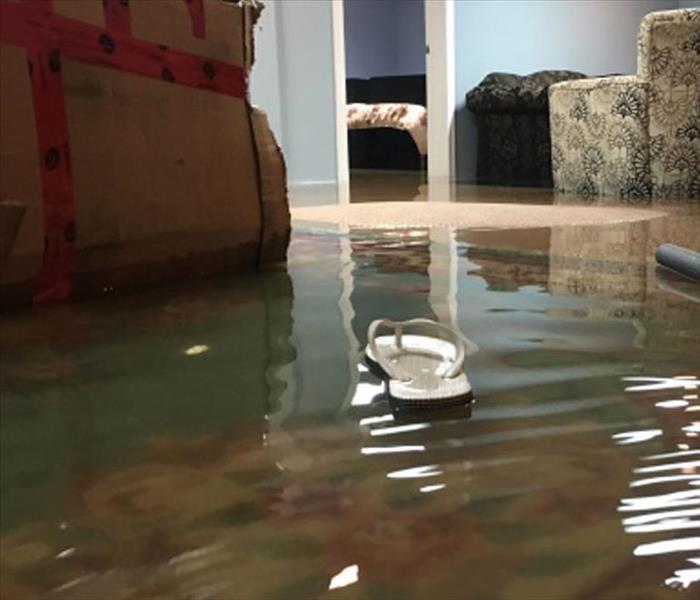 Long Island flooded finished basement
Long Island flooded finished basement
Spring is almost here and the flowers are starting to bloom. Humid and warm weather is coming and you are about to break out your sandals and shorts. But along this warmer season comes lots of spring rain. Though this rain is highly beneficial for your garden and yard, it may not be a good thing for your basements. April showers bring flooded basements and if your basement is vulnerable, you need some preventive tips. Water in the basement usually occurs in the case of heavy rainfall. With the tips given in this article, you can surely reduce the chances of basement flooded this season.
Check Cracks
Examine foundation and basement walls for any crack. Watermarks close to these cracks are usually the sign of current leaks and potential risks. You can apply concrete patches to repair the cracks or you can call SERVPRO of East Meadow / Westbury for leak detection and repair services.
Check sump pump
Check the basement sump pump. Make sure that it is releasing water appropriately and there is no debris inside. Debris can clog the pump. If any debris is found, remove it by pouring buckets of water into the sump pit. This helps to unblock the pump and makes it discharge water and shut itself off. If the pump is running on a continuous basis and not shutting off, there is some problem. Call our home emergency restoration services immediately as the pump may burn itself out and become defective if left as it is.
If the sump pump is used frequently, you can also install a battery backup unit that can be used in case of a power failure.
Basement flood alarm
A range of battery operated and inexpensive flood alarms are available that can be placed in the basement close to the sump pump or in the areas that are susceptible to flooding, including the laundry room and places next to doorways, water heater etc. If there is water, the alarm will ring letting you act promptly. Protect your valuables by shifting them from the basement floor to elevated areas or shelves.
Check outside areas
Make sure that your roof gutters and downspouts are clean. Ensure that they are not clogged and able to channel water away from the home rapidly. Downspouts shout exit at least 6ft from the house. Inspect your yard drainage and the culverts and remove obstructions like leaves, debris to make sure easy and quick flow of runoff water. Check the flow of any street drains present in front of your building as all that rushing water can easily make its way into your home.
Appliances in Basement
If you have placed some appliances like space heaters, washers or dryers in your basement, disconnect their power source in case of flood warnings. However, if these are submerged or level of water is higher, don’t go in basement and risk electrocution. In order to prevent interior accidental flooding, examine all appliances on a regular basis. If they are of over 10 years, it’s better to replace them.
From time to time, pour gallons of water into the floor drains in your bathrooms, garages, patios and basements. If drainage is not occurring quickly, call the pros at Long Island's best restoration company - SERVPRO of East Meadow Westbury. We are one of the leading providers of drainage, plumbing, water leakage detection and repair and emergency home restoration services. For more information and emergency guidance and help, call us right away.
Flood Prevention
3/8/2017 (Permalink)
Believe it or not, Flooding is the most common natural disaster in the United States. According to the National Flood Insurance Program, between 2001 and 2010 it caused over $2.7 Billion in damage. Unfortunately, your homeowner's insurance policy doesn’t cover Flooding which means you need to buy a separate flood insurance policy. The main way to prevent Flood damage is to take precautions which usually can take only a few hours to a few days. Follow these tips to reduce the chances of Flood damage!
- Fix leaks immediately: When you see wet spots on the ceiling or cracks in the foundation, fix them as soon as soon as possible.
- Get extra roof protection. install a rubber roof underlayment, a waterproof barrier that goes under the shingles and protects the roof from water intrusion.
- Close foundation cracks. with mortar and masonry caulk or hydraulic cement.
What Causes Water Damage In Homes? (4)
12/13/2016 (Permalink)
Believe it or not, toilets cause a huge threat when it comes to water damage in homes. Not many people seem to realise that toilets can overflow and cause a lot of water damage inside the house. Toilet failures in the IBHS study cost more than $5,500 per incident after the deductible was paid. One-third of all toilet failures in the study resulted from an overflowing or clogged toilet.
Ways to Reduce Damage
- After you flush, make sure you wait for the valve to completely finish refilling the tank and bowl. If an overflow looks imminent, turn off the supply valve.
- Twice a year, inspect a toilet’s components, such as the fill, supply and flush valves and the supply line.
- Consider upgrading the toilet’s supply line to a sturdier braided steel hose.
What Causes Water Damage In Homes? (3)
12/13/2016 (Permalink)
Leaking Pipes
If you have a leaking pipe then this can often lead to destructive Water damage in your home without your even being aware. What causes leaking pipes? There are actually a number of things. For instance, if your Water is the wrong level of acidity, then this doesn’t allow for the formation of a film on the inside of copper pipes. Ultimately this causes them to become dissolved. Sometimes it can be as simple as rust setting in or a valve or tap not being properly turned off.How do you know if you have leaking pipes if you can’t see the water damage? One sign might be from your taps – if your water is discolored (brown or yellowish), or if the water pressure seems low, then this might point to a leak.
What Causes Water Damage In Homes? (2)
12/13/2016 (Permalink)
Gutters
Often forgotten, gutter pose a huge threat to the safety of your home when it comes to water damage. Normally, your gutters have the job of directing water away from your roof and away from your building more generally as it runs off the edges. This will work fine though until the gutters become blocked with debris such as leaves and branches and thus another dam forms. Now the water will begin to overflow over the edges of the gutters and thus start running down the side of the house. This same problem can also be one of the causes of water damage in other ways. For instance, if there should be a crack or a hole in your gutter, then the water will leak down the side of the building even when there isn’t heavy rain.
What Causes Water Damage In Homes? (1)
12/13/2016 (Permalink)
Flat Roofs
A flat roof should have a slight gradient to it. Flat roofs are not normally actually flat. A flat roof then is very slightly convex and that’s how it is able to gradually cause water to run off of it and into your gutters. This slight slope can sometimes be undermined by various issues or it can deteriorate and slightly give way to create a genuinely flat or even concave shaped roof. If leaves, branches and debris should build up on your roof. This can create enough weight in order to apple pressure to the weakest point of the flat roof, thus causing it to collapse inward slightly. Thus, all water will now pool on the top of the roof instead of running off of it. you now have standing water on your roof which can be one of the causes of Water damage and Mold to form on the ceiling and the roof itself and which can cause a crack and a leak in your ceiling.
Keep Safe From Flooding
12/1/2016 (Permalink)
Flooding is the most common natural disaster in the United States. According to the National Flood Insurance Program, it caused $2.7 billion in losses between 2001 and 2010. The key to reducing Flood damage is to take precautions. Many cases you can accomplish in a few hours to a few days. In case you need to leave quickly, it's good to have a bag with items that can be very important. This includes:
- A few changes of clothing for you and family members
- Insurance policy numbers
- Phone numbers of your agent
- Your insurance company’s main number
- Essential toiletries
- Money to get you through a few days
Some things you can do to prevent the actual Flood are:
- Spring for extra roof protection
Flooded basement in Westbury
6/9/2016 (Permalink)
A severe rain storm caused a basement in Westbury to flood. After all the water was pumped out, there was a mess left behind. Contents and personal items were affected. Theres no such thing as a small disaster, especially when the water you dont see contains bacteria or causes mold, rot and other unseen damage. SERVPRO of East Meadow/ Westbury understands how disruptive unseen water damage can be to your home. Water damage can affect the value of your property. So before you risk futher damage to the value of your home by attemting to clean up the mess yourself, call SERVPRO of East Meadow/ Westbury. We are trained professionals that can help you quickly take control while drying, deodorizing and protecting your home and its contents
Freezing temps mean freezing pipes. What can you do to prevent this?
1/6/2016 (Permalink)
http://www.redcross.org/prepare/disaster/winter-storm/preventing-thawing-frozen-pipes The frigid temps are finally here upon us! You come home from a long day, try to do a load of laundry, enter your basement and SPLASH! Suddenly you're immersed in a puddle of water. That's where we come in to help. But, how do you prevent the headaches and expenses of replacing damaged items and potentially costly reconstruction?
Here are a few tips from the American Red Cross to help.
Stay warm from your friend at SERVPRO of East Meadow / Westbury!




 24/7 Emergency Service
24/7 Emergency Service
